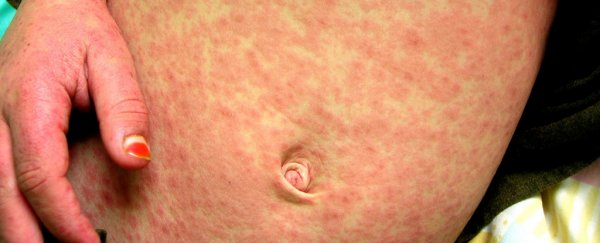Back in August, Indonesia's peak Islamic body officially declared the measles and rubella vaccine forbidden, under assertions they were based on material derived from pigs.
In spite of exceptions permitting the use of the vaccine in the absence of suitable alternatives, millions of Indonesians have followed the spirit of the ruling, causing immunisation rates to plummet.
The religious proclamation – or fatwa – made by the Indonesian Ulama Council (MUI) isn't in any way legally binding.
But those of strict Islamic faith take such decrees seriously, and with doubt and misinformation already making so many hesitate, it's enough to have caused a significant decline in the delivery of the measles and rubella vaccine across the nation.
Thanks largely to geographical isolation and socioeconomic factors, Indonesia has struggled to vaccinate a significant proportion of its people, leading to large pockets where outbreaks of communicable diseases like measles aren't uncommon.
Anti-vaccination sentiments most certainly haven't helped. Health authorities in Muslim countries around the globe have been forced to deal with growing public mistrust over immunisation, leading to a rise in preventable illnesses.
Under the encouragement of the World Health Organisation's Global Vaccine Action Plan, Indonesian health authorities have made a concerted effort to stamp out measles and rubella.
This has meant overcoming significant obstacles to roll out a vaccination program on the island of Java targeting nearly 70 million children aged between 9 months and 15 years.
So far, signs have been promising.
"We are happy to have achieved our target of 95 percent coverage," East Java's governor Soekarwo said last year.
"But we have promised that we would deliver 100 percent. And this should happen across the province."
These efforts require public support, which means assuring parents not only that vaccines are safe and effective, but don't conflict with religious beliefs.
Central to concerns is the use of pig-derived gelatine as a stabilising agent in certain vaccines.
This isn't considered to be a serious problem by most Jewish and Islamic religious groups, especially when public health is at stake. Previous vaccines in Indonesia weren't considered clean, or halal, either.
In fact, the Terengganu State Fatwa Committee in Malaysia issued their own ruling making it compulsory for Muslims to vaccinate in 2016.
So the Indonesian Department of Health approached the MUI in request of a similar fatwa as the one that had been issued in Malaysia. What they got was the opposite – a haram, or outlawing, of vaccines.
With the fatwa in place, health authorities face an uphill battle to meet their promise not just in Java, but in other provinces.
The council were careful to admit there were significant risks to public health in the absence of vaccination and that there were currently no acceptable alternatives to the measles-rubella vaccine.
In principle, the fatwa was a begrudging admission that those of Islamic faith were obligated to immunise their families using an 'illegal' vaccine. Meanwhile, authorities had to search for an alternative.
But the effects of this confusing statement have been profound. In sharp contrast to the near complete vaccination on Java, other districts have experienced coverage as low as 7 percent amid haram concerns.
The governor of the ultra-conservative province of Aceh has since backed the vaccination program, but it's left to be seen whether this will make a significant difference to its coverage.
For rubella vaccination programs to be successful, around 80 percent of the population needs to be immune. Targets for measles are even higher, at around 95 percent.
Indonesia has significant hurdles to overcome to reach such ambitious targets. A halal vaccine could solve the problem once and for all, using cow-derived gelatine instead. Such a vaccine would still require years of testing.
Let's hope the MUI adjusts its position soon, and helps all people, regardless of their faith, guard against these debilitating and deadly diseases.
